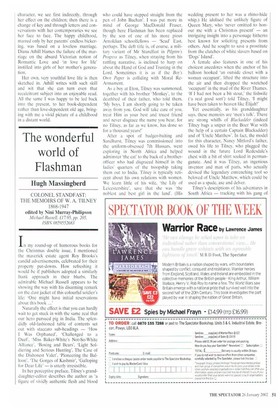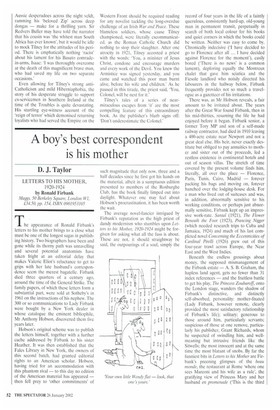The wonderful world of Flashman
Hugh Mass ingberd
COLONEL STANDFAST: THE MEMOIRS OF W. A. TILNEY 1868-1947 edited by Nini Murray-Philipson Michael Russell, £17.95, pp. 205, ISBN 0859552683 In my round-up of humorous books for the Christmas double issue, 1 mentioned the maverick estate agent Roy Brooks's candid advertisements, celebrated for their property put-downs. How refreshing it would be if publishers adopted a similarly frank approach in their blurbs. The admirable Michael Russell appears to be showing the way with his disarming remark on the dust jacket of this colourful soldier's life: 'One might have initial reservations about this book .„' Naturally the effect is that you can hardly wait to get stuck in with the same zeal that our hero pursued pig in India. The splendidly old-fashioned table of contents set out with staccato sub-headings — 'How I Was Orphaned', 'Challenged to a Duel', 'Miss Baker-White's Not-So-White Alliance', 'Boxing and Bears', 'Light Soldiering and Serious Hunting', The Case of the Dishonest Valet', 'Pioneering the Balloon-, 'The Gorges of Kashmir', 'Galloping for Dear Life' — is utterly irresistible.
In her perceptive preface, Tilney's granddaughter-editor describes the author as 'a figure of vividly authentic flesh and blood
who could have stepped straight from the pen of John Buchan'. I was put more in mind of George MacDonald Fraser, though here Flashman has been replaced by the son of one of his more pious Arnoldian schoolfellows — 'Scud' East, perhaps. The deft title is, of course, a military variant of Mr Standfast in Pilgrim's Progress as Tilney, when straying from his rattling narrative, is inclined to harp on about the Hand of God and Trusting in the Lord. Sometimes it is as if the Boy's Own Paper is colliding with Moral ReArmament.
As a boy at Eton, Tilney was summoned, together with his brother 'Monkey', to the deathbed of their father, who told them, 'My boys, 1 am shortly going to be taken away from you. God will take care of you, treat Him as your best and truest friend and never disgrace the name you bear, for no Tilney, as far as we know, has done so for a thousand years!'
After a spot of badger-baiting and Sandhurst. Tilney was commissioned into the uniform-obsessed 7th Hussars, went exploring in North Africa and helped adminster 'the cat' to the back of a brotherofficer who had disgraced himself in the ladies' quarters of the troopship taking them out to India. Tilney is typically reticent about his own relations with women. We learn little of his wife, 'the Lily of Leicestershire', save that she was 'the noblest and best girl in the land'. (His wedding present to her was a rhino-hide whip.) He idolised the unlikely figure of Queen Mary, who 'never omitted to honour me with a Christmas present' — an intriguing insight into a personage hitherto best known for soliciting presents from others. And he sought to save a prostitute from the clutches of white slavers based on 'Dogs' Island'.
A female also features in one of his choicest anecdotes when the anchor of his balloon hooked 'an outside closet with a woman occupant', lifted the structure into the air and then dropped the wretched 'occupant' in the mud of the River Thames. 'If I had not been a bit stout,' the fishwife Ca real good sort') told Tilney, 1 might have been taken to heaven like Elijah!'
Yet essentially, as his granddaughter says, these memoirs are `men's talk', There are strong whiffs of Blackackler (indeed Tilney bags a sniper in the Boer War with the help of a certain Captain Blackadder) and of 'Uncle Matthew'. In fact, the model for this character, Nancy Mitford's father, owed his life to Tilney, who plugged the wound in the future Lord Redesdale's chest with a bit of shirt soaked in permanganate. And it was Tilney, an ingenious inventor and man of parts, who actually devised the legendary entrenching tool so beloved of Uncle Matthew, which could be used as a spade, axe and delver.
Tilney's descriptions of his adventures in South Africa — tracking with his gang of Aussie desperadoes across the night veldt, ramming his 'beloved Zip' across deep dongas — make for a thrilling yarn. Sir Redvers Buller may have told the narrator that his cousin was 'the whitest man South Africa has ever known', but it would be idle to mock Tilney for the attitudes of his period. There is emphatically nothing 'racist' about his lament for his Basuto comradein-arms, Isaac: 'I was thoroughly overcome at the death of this magnificent brave man, who had saved my life on two separate occasions.'
Even allowing for Tilney's strong antiCatholicism and mild Hiberniaphobia, the story of his desperate struggle to support ex-servicemen in Southern Ireland at the time of the Troubles is quite devastating. His startling eye-witness account of the 'reign of terror' which demonised returning loyalists who had served the Empire on the Western Front should be required reading for any novelist tackling the long-overdue challenge of an Irish War and Peace. These blameless soldiers, whose cause Tilney championed, were literally excommunicated, as the Roman Catholic Church did nothing to stop their slaughter. After one atrocity in 1921, Tilney accosted a priest with the words: 'You, a minister of Jesus Christ, condone and encourage murders and every work of the Devil. You knew the Armistice was signed yesterday, and you came and watched this poor man burnt alive, before his wife and children.' As he paused in this tirade, the priest said, 'You, Colonel, will be next for it.'
Tilney's tales of a series of nearmiraculous escapes from 'it' are the most compelling feature of this extraordinary book. As the publisher's blurb signs off: 'Don't underestimate the Colonel.'



















































































 Previous page
Previous page